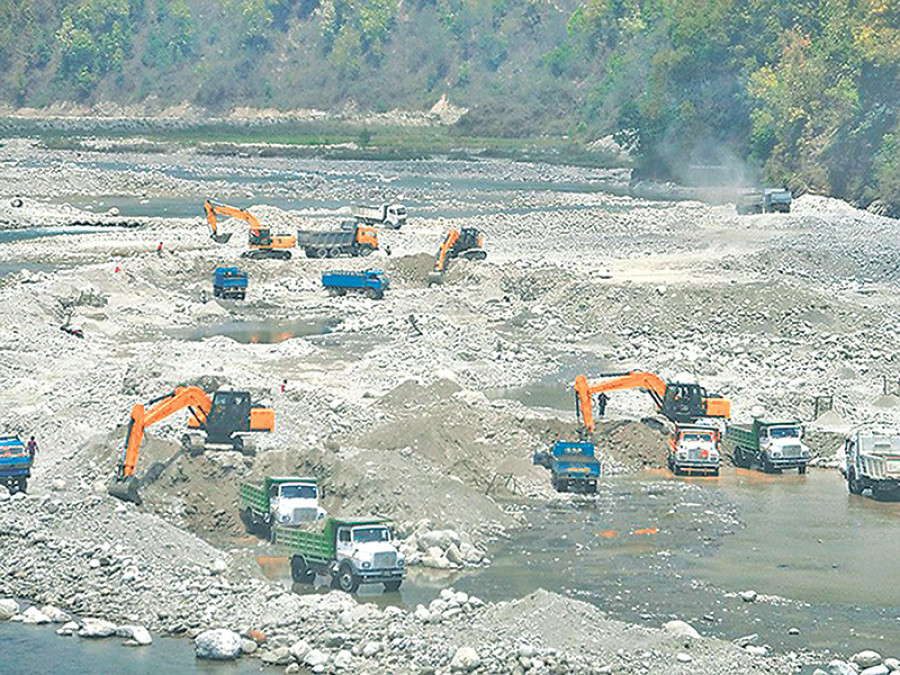Money
Illegal mining ramps up as Dashain begins
Illegal mining of sand and other construction materials at locations around Trishuli River have become a common occurance as the authority’s monitoring have waned with the beginning of Dashain, the main festival of Hindus.
Harihar Singh Rathaur
Illegal mining of sand and other construction materials at locations around Trishuli River have become a common occurance as the authority’s monitoring have waned with the beginning of Dashain, the main festival of Hindus.
These illicit activities are conducted by contractors and traders at night to avoid the monitoring committee which had prohibited illegal mining just two weeks ago.
Sand mines in Benighat, Gajuri, Galchhi,Thakre have been mined illegally. Other places where illegal mining occurs are the locations around Prithvi Highway and Salyantar, which lies near the Netrawati River.
Political parties are suspected of offering protection to the illegal mining activities as they are not taking the initiative in curbing these activities.
Contractors are also wantonly extracting more than the specified quota set by the Department of Mines and Geology (DoMG).
Contractors are allowed to extract 26 tonnes of sand annually from each of the two mines located in Gajuri and Galchhi.
However, contractors have been extracting 150-200 trucks full of sand daily, way more than the quantity permitted, said Jiblal Bhusal, local development officer and member-secretary of District Natural Resource Monitoring Committee.
According to Bhusal, they have repeatedly informed the DoGM regarding the malpractices. “However, our requests have so far remained unheard.”
These contractors have been found to be investing large amounts of money to bribe the relevant officials, who turn a blind eye to such malpractices.
Even crusher operators are in on the action, paying their fair share of bribes to officials and this has in turn hiked up prices.
Bhusal has sought government policy intervention in controlling the escalating extraction of the construction materials.
According to him, the dubious policy has helped neither in penalising the wrongdoers nor managing the crusher industry properly.
Sitaram Prasad Verma, a social leader, blamed the contractors and traders to
be engaged in black-marketing of construction materials just on pretext of production being done in limited quantity.
There are an estimated 30 crushers operating in the highway area of Dhading district. In addition, many others have been operating without a licence.
Lack of coordination among the concerned authority has also been identified as one of the major causes in soaring smuggling of the construction materials.
Liladhar Adhikari, assistant chief district officer at District Administration Office, Dhading, said they had made multiple attempts to catch the unscrupulous contractors on the spot.
“However, we had to return empty hand as the crusher operators instantly fled away from the site when we reached the area,” Adhikari said.
Last week, the joint monitoring team fined seven crusher operators Rs25,000 each for extracting sand without getting proper approval from the government.
A large number of tractors have also been found transporting the illegally extracted construction materials.
These tractors are suspected to have been imported under the guise of agricultural farming. But they are used for illegal activities instead.
The government had barred these tractors from transporting construction materials. However, pressure from political parties is said to have forced the authority to turn a blind eye over controlling such activities.
Nearly 400 tractors imported for agricultural use have been reported ferrying construction materials in the area.
Apart from Dhading, contractors in other locations such as Tanahu, Chitwan and Nuwakot have also been selling illegally extracted construction materials.
Hundreds of trucks are transporting the illegally mined materials to the Capital. The illegal extraction of construction materials has increased pollution and hiked up prices, which has affected Nepal’s reconstruction drive adversely.
Govinda Pokharel, executive director at Reconstruction Authority, said they had repeatedly sent letters to the higher authority to ensure smooth supply of the construction materials along with controlling the artificial price hike in order drive
the reconstruction at a faster pace.




 21.02°C Kathmandu
21.02°C Kathmandu














